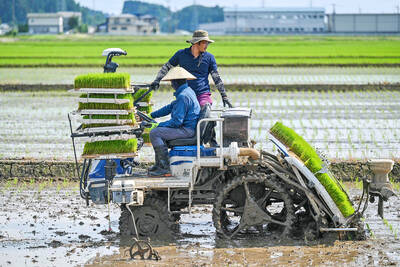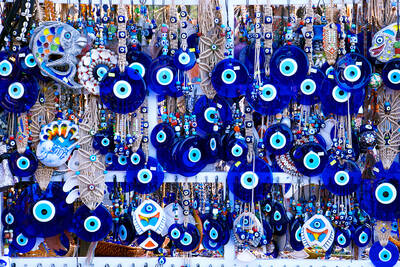Creating a country in an area controlled for decades by foreigners is no easy task. The people of Ghana know this well, and have seen its history develop through many changes. Today, many people look to Ghana as a symbol of progress. Read on the find out more about the unique character of this resource-rich country.
要在被外國人統治數十年的地區建國可不事件容易的事,這點迦納人了然於心,其歷史發展歷經諸多變遷,今日許多人視迦納為進步的象徵.往下讀,深入了解這富饒資源國度獨特的一面.
A closer look 說古論今
As far as countries go, Ghana is a relatively new one.
The area that is the country of Ghana today used to be ruled by the British government, just as many countries in the area used to be under the control of a European different tribes of people who were organized under different chiefs. In 1957, several smaller regions came together to declare independence from Britain, and Ghana became a country. At the time, Ghana was the first sub-Saharan African country to become independent from a colonial power. Politically, Ghana's history has been very turbulent since independence. Although Ghana's history is not as violent or bloody as those of some of its west African neighbors, for many years Ghana did not have a stable government. However, today its government works hard to make education and economic growth a top priority, and many people look to Ghana as a success story among African nations.
Because Ghanaians never used to have a single identity, there are many different languages, types of music and kinds of food in Ghana. But one thing that Ghanaians are known for is the bright, colorful patterns on the Kente cloth that they make. Kente cloth, and the symbols woven into it, are an important part of Ghanaian culture. The cloth is still worn by many of Ghana's people and all of its chiefs.
從國家歷史來看,迦納相對說來世個新興國家,今日的迦納曾被英國政府統治,正如該區許多曾被歐洲政權掌握的國家一樣.迦魶境內曾有眾多由不同酋長所帶領的不同部落.一九五七年,幾個小地區聯合宣布脫離英國獨立,使迦納成為獨立國家,當時迦納是薩哈拉沙漠以南第一個自殖民強權獨立的非洲國家.迦納獨立後的政局醫直動盪不安,其歷史雖然不如部分西非鄰國血腥暴力,卻常年沒有問定的政府.不過,今日的迦納政府致力將教育和經濟成長視為重要之物,許多人也將迦納視為非洲國家的成功傳奇.
過去迦納人從未有單一的認同感,因此迦納境內存在許多不同的語音,音樂類型和食物種類,不過迦納人所製造的坎特服.色繽紛亮麗,頗負盛名.坎特服和上面所織的圖騰是迦納文化重要的醫部份,許多迦納人及所有酋長至今仍身穿坎特服.

Rice is essential to Japanese culture, tradition and politics. People take pride in the oval-shaped sticky Japonica grain, which is still a staple even though total consumption has fallen over the decades. But since last summer, prices have soared as supplies have fallen short of demand. The government has long paid farmers to cut back on rice acreage, and change to other crops to keep rice prices relatively high. To cope with shortfalls this year, the government has released rice reserves. But the grain has been slow to reach supermarket shelves. Anger over that was part of the reason the Agriculture Minister

Step into any corner of Turkiye, and you’ll likely encounter the iconic “Evil Eye,” known as “nazar boncu?u” in Turkish. This striking blue glass ornament is shaped like an eye with concentric circles of dark blue, white, and light blue. While its name in English suggests something threatening, it’s actually a charm designed to ward off misfortune. The origins of the nazar boncu?u can be traced back to ancient Mediterranean and Middle Eastern traditions. The word nazar comes from Arabic, meaning “gaze,” while boncu?u translates to “bead” in Turkish. Central to the nazar boncu?u’s mythology is the idea that

A: Wow, Les Miserables Staged Concert Spectacular is visiting Taiwan for the first time. B: Isn’t Les Miserables often praised as one of the world’s four greatest musicals? A: Yup. Its concert is touring Taipei from tonight to July 6, and Kaohsiung between July 10 and 27. B: The English version of the French musical, based on writer Victor Hugo’s masterpiece, has been a huge success throughout the four decades since its debut in 1985. A: The musical has never toured Taiwan, but going to the concert sounds like fun, too. A: 哇,音樂劇《悲慘世界》紀念版音樂會首度來台巡演! B: 《悲慘世界》……它不是常被譽為全球四大名劇之一嗎? A: 對啊音樂會將從今晚到7月6日在台北演出,從7月10日到27日在高雄演出。 B: 這部法文音樂劇的英文版,改編自維克多雨果的同名小說,自1985年首演以來,在過去40年造成轟動。 A:

Continued from yesterday(延續自昨日) https://www.taipeitimes.com/News/lang In 1946, the company adopted the name 7-Eleven to reflect its newly extended __3__, from 7am to 11pm, a novel concept at the time. As a rapidly growing company, it began offering franchise opportunities in the 1960s. In 1974, the first 7-Eleven in Japan was opened by the supermarket company Ito-Yokado. The Japanese franchises were __4__ successful that by 1991, Ito-Yokado was able to acquire a 70 percent stake in Southland Corporation. Its investments eventually resulted in full ownership of 7-Eleven, which paved the way for the Japanese company to enter the international market. Since then, 7-Eleven